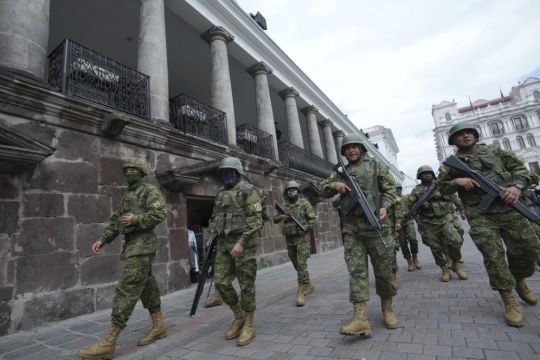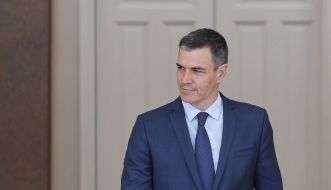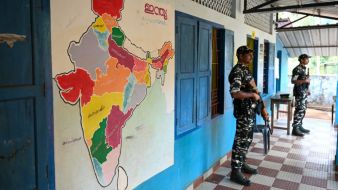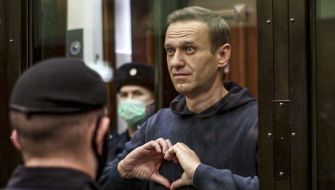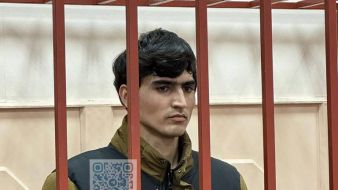The invasion by masked gunmen of the TC Television studio in Ecuador, with its mid-afternoon newscast under way, has brought home the scale of lawlessness in the South American nation to its people.
The gunmen burst in, unleashing at least 15 minutes of threats and fear, all broadcast live.
First, a man with a pistol appeared in the middle of the public TV station’s live transmission, followed by a second man with a shotgun, then a third and more.
With the show’s After The News title behind them, station employees were brought onto the set and ordered to lie down.
Screams could be heard followed by the sound of gunshots.
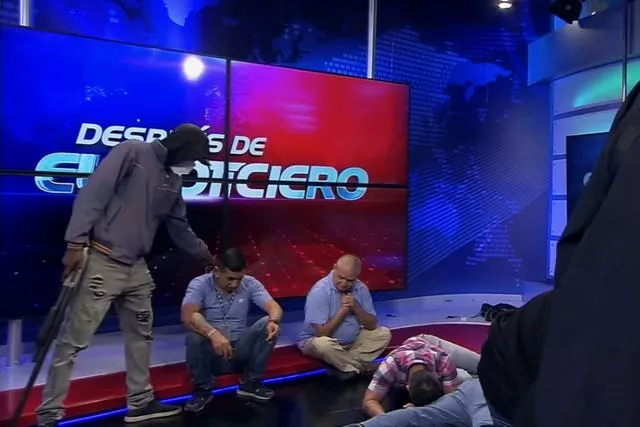
“We are on air, so you know that you cannot play with the mafia,” one of the assailants is heard saying.
Masked men could be seen aiming guns at news staff.
Someone said: “Don’t shoot!”
After about 15 minutes the transmission was cut.
The unprecedented assault on the TV station in Guayaquil, a port city in Ecuador, came hours after a series of other attacks and police officer abductions.
It also followed the apparent escapes from prison of two of the leaders of the country’s most powerful gangs.
No one was killed in Tuesday’s attack and authorities say the 13 attackers were arrested and would be charged with terrorism.
Ecaudor's president Daniel Noboa, who came into power in November with a promise to bring peace to the South American country, issued a decree saying the violence-plagued country had entered an “internal armed conflict”, in what some analysts see as a watershed moment for Ecuador.
Late on Tuesday, Mr Noboa met with his security Cabinet and, afterward, the head of the Armed Forces Joint Command said the attacks were the gangs’ reactions to the government’s moves against them.
“They have unleashed a wave of violence to frighten the population,” Admiral Jaime Vela told journalists, describing the attacks as “unprecedented” in Ecuador’s history.
The South American country had been rocked by attacks since Monday night, but the assault on the newscast was seen in real time in thousands of homes across the country.
“This is a turning point,” said Will Freeman, a political analyst at the Council on Foreign Relations, adding that while gangs in Ecuador assassinated presidential candidate Fernando Villavicencio and set off car bombs in front of government buildings, Tuesday’s events marked a new peak in violence.
“Depending on how the government responds, it will set the precedent for these kinds of incidents to continue, or it will use this as a catalyst and make some very necessary structural reforms so that the state can start to win its war against crime,” Mr Freeman said.
Alina Manrique, the head of news for TC Television, was ordered to get on the floor.
“They aimed the gun at my head,” she said.
“I thought about my entire life, about my two children.”

Ms Manrique said some of the assailants ran from the studio and tried to hide when they realized they were surrounded by police.
“I am still in shock,” she said.
“Everything has collapsed. … All I know is that it’s time to leave this country and go very far away.”
Police officers entered the TV station and subdued the attackers, who can face up to 13 years in prison it they are convicted of terrorism.
On Monday, a day after a notorious gang leader’s apparent escape from prison, Mr Noboa had declared a national state of emergency, a measure that lets authorities suspend people’s rights and mobilize the military in places like prisons.
On Tuesday, shortly after the gunmen stormed the TV station, Noboa issued another decree designating 20 drug-trafficking gangs operating in the country as terror groups, and authorising Ecuador’s military to “neutralise” them within the bounds of international humanitarian law.
The government has said at least 30 attacks have taken place since authorities announced that Los Choneros gang leader Adolfo Macias, alias Fito, was discovered missing from his cell in a low-security prison on Sunday.
He was scheduled to be transferred to a maximum security facility that day.
Ecuadorean officials on Tuesday announced that another gang leader, Fabricio Colon Pico of the Los Lobos group, had escaped from a prison in the town of Riobamba.
Colon Pico was captured on Friday as part of a kidnapping investigation and has also been accused of trying to murder one of the nation’s lead prosecutors.
Other attacks include an explosion near the house of the president of the National Justice Court and the Monday night kidnappings of four police officers.
Police said one officer was abducted in the capital, Quito, and three in Quevedo city.
Authorities say Los Choneros, one of the Ecuadorian gangs considered responsible for a spike in violence mostly tied to drug trafficking, has links with Mexico’s Sinaloa cartel.
Macias’ whereabouts are unknown.

Prosecutors opened an investigation and charged two guards in connection with his alleged escape, but neither the police, the corrections system, nor the federal government confirmed whether the prisoner fled the facility or might be hiding in it.
In February 2013, he escaped from a maximum security facility but was recaptured weeks later.
Macías, who was convicted of drug trafficking, murder and organised crime, was serving a 36-year sentence in La Regional prison in the port of Guayaquil.
Located on South America’s Pacific coast between Peru and Colombia, the world’s largest cocaine producers, Ecuador has become a key transit point for the drug in recent years.
Much of the violence suffered by the country comes as drug gangs fight each other and the government for control of ports and smuggling routes.
